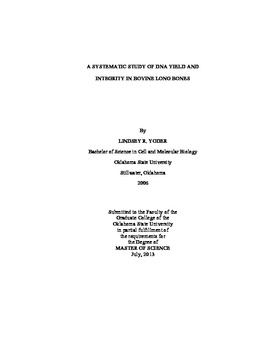| dc.contributor.advisor | Allen, Robert W. | |
| dc.contributor.author | Hollaway-Yoder, Lindsey R | |
| dc.date.accessioned | 2014-09-24T14:18:31Z | |
| dc.date.available | 2014-09-24T14:18:31Z | |
| dc.date.issued | 2013-07-01 | |
| dc.identifier.uri | https://hdl.handle.net/11244/11159 | |
| dc.description.abstract | The purpose of this study was to identify a single source of bone that produced the most abundant, intact, and well-preserved deoxyribonucleic acid (DNA). The specific aim was approached through an experimental design using Bos indicus (the cow) femora presenting various degrees/modes of decomposition as sample material. Chips of bone were excised from seven locations on each femur including spongy and compact tissue types. DNA was isolated using procedures standard to functional forensic crime laboratories and subsequently quantified using Q-TAT and RT-qPCR assays. Furthermore, genomic degradation and the presence of PCR inhibitors for each sample was measured. Samples were successfully quantified using both Q-TAT and RT-qPCR technology and subsequently assessed for levels of degradation and PCR inhibition. Results from the Q-TAT assay suggested that spongy bone samples contained the presence of PCR inhibitors as evidenced by failed amplifications in 88% of reactions. Samples with failed amplification became ineligible for further analyses, making compact bone samples essentially the only tissues to produce data. The RT-qPCR assay amplified 97% of samples in the study allowing for a more comprehensive analysis of resulting data. Although not significant, compact bone samples yielded the most DNA and indicated low levels of genomic degradation and PCR inhibitors. Resulting data for compact bone samples was consistent across test groups, however variation in spongy bone was observed between bone groups. This finding suggests, that in general, compact bone is an ideal source for forensic analysis, however additional considerations can be made if spongy bone must be used. | |
| dc.format | application/pdf | |
| dc.language | en_US | |
| dc.publisher | Oklahoma State University | |
| dc.rights | Copyright is held by the author who has granted the Oklahoma State University Library the non-exclusive right to share this material in its institutional repository. Contact Digital Library Services at lib-dls@okstate.edu or 405-744-9161 for the permission policy on the use, reproduction or distribution of this material. | |
| dc.title | Systematic Study of Dna Yield and Integrity in Bovine Long Bones | |
| dc.type | text | |
| dc.contributor.committeeMember | Wagner, Jarrad | |
| dc.contributor.committeeMember | Smith, Kent | |
| osu.filename | HollawayYoder_okstate_0664M_12974.pdf | |
| osu.accesstype | Open Access | |
| dc.description.department | Forensic Sciences | |
| dc.type.genre | Thesis | |
| dc.subject.keywords | dna quantification | |
| dc.subject.keywords | forensic science | |
| dc.subject.keywords | pcr inhibition | |
| dc.subject.keywords | skeletal remains | |
